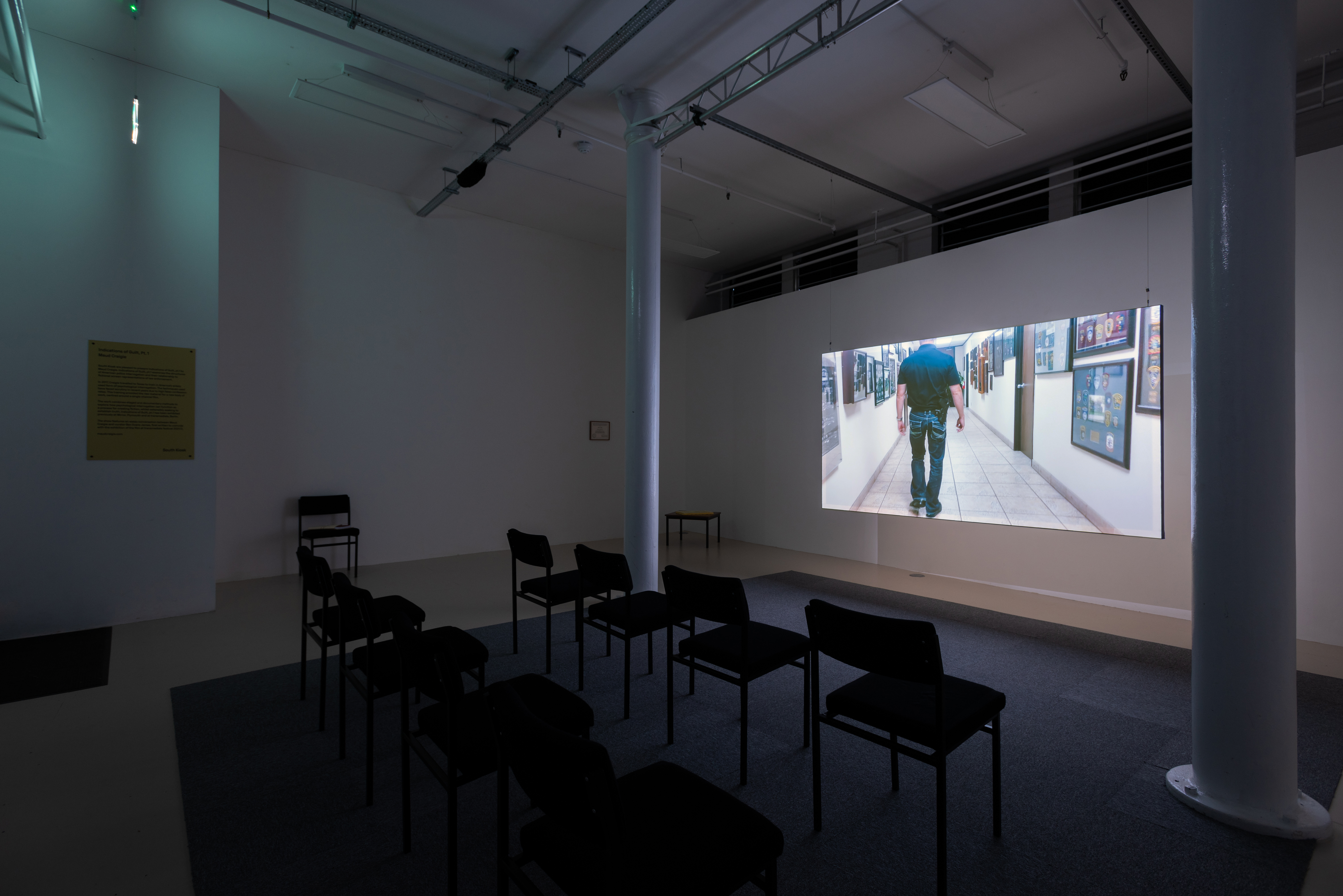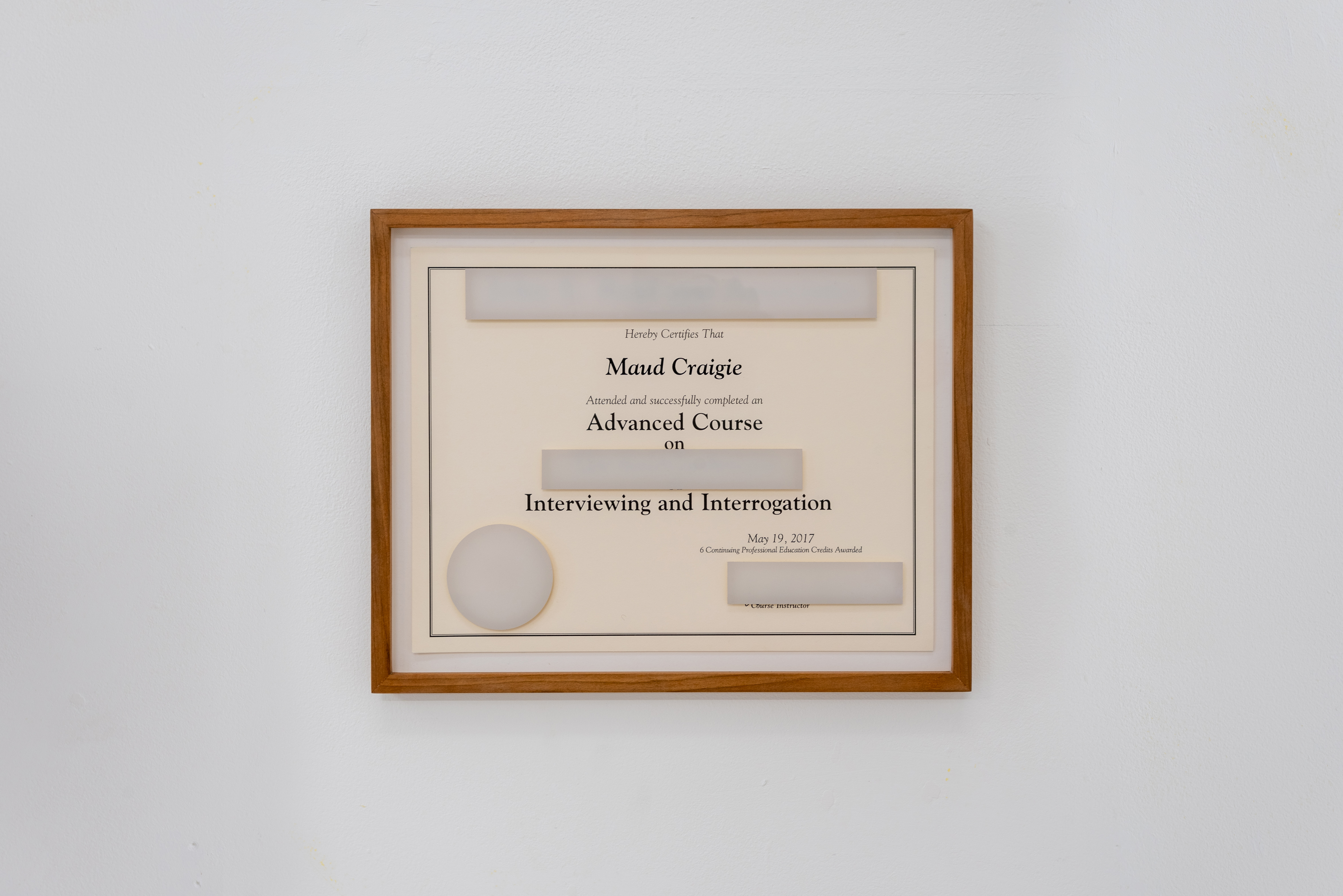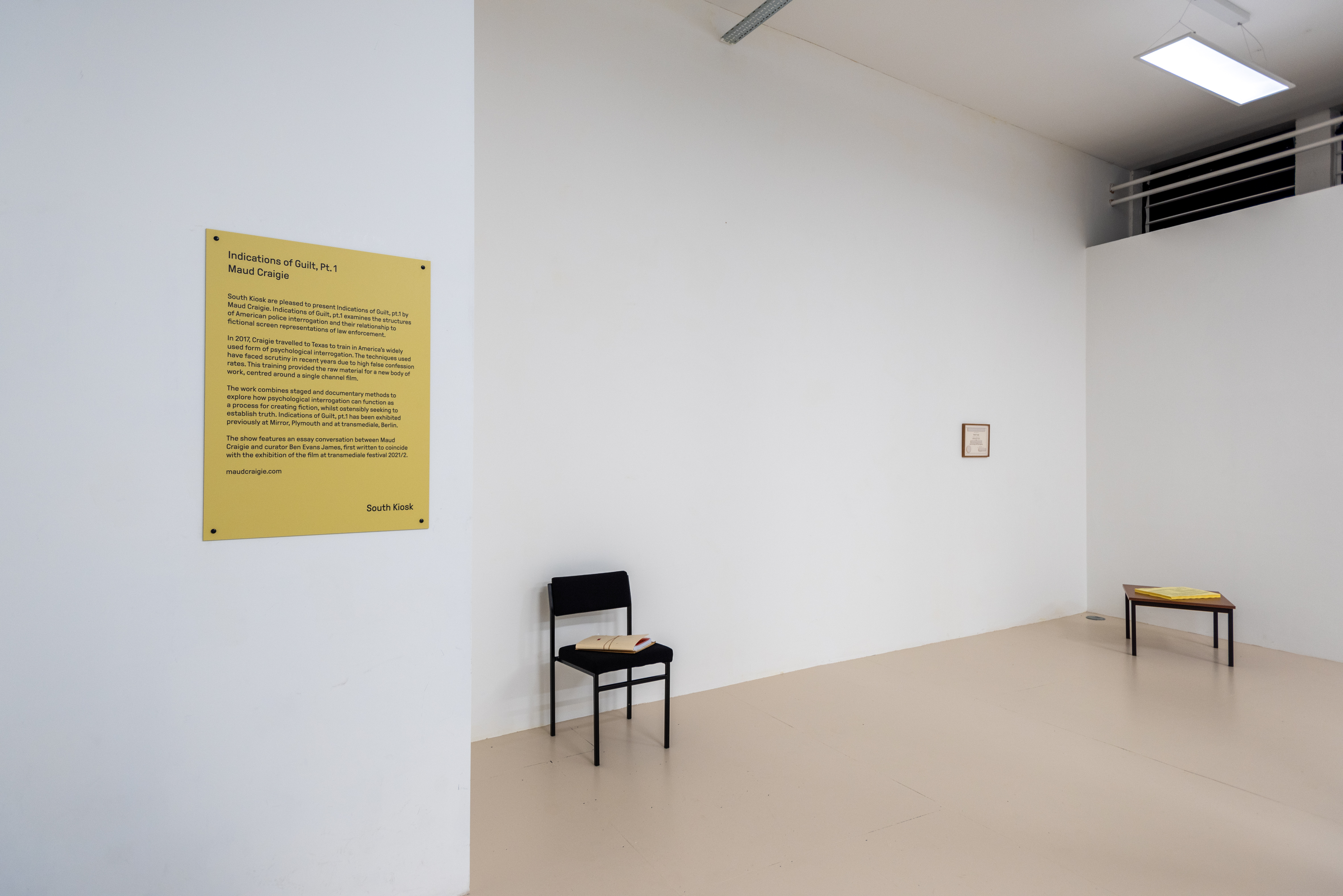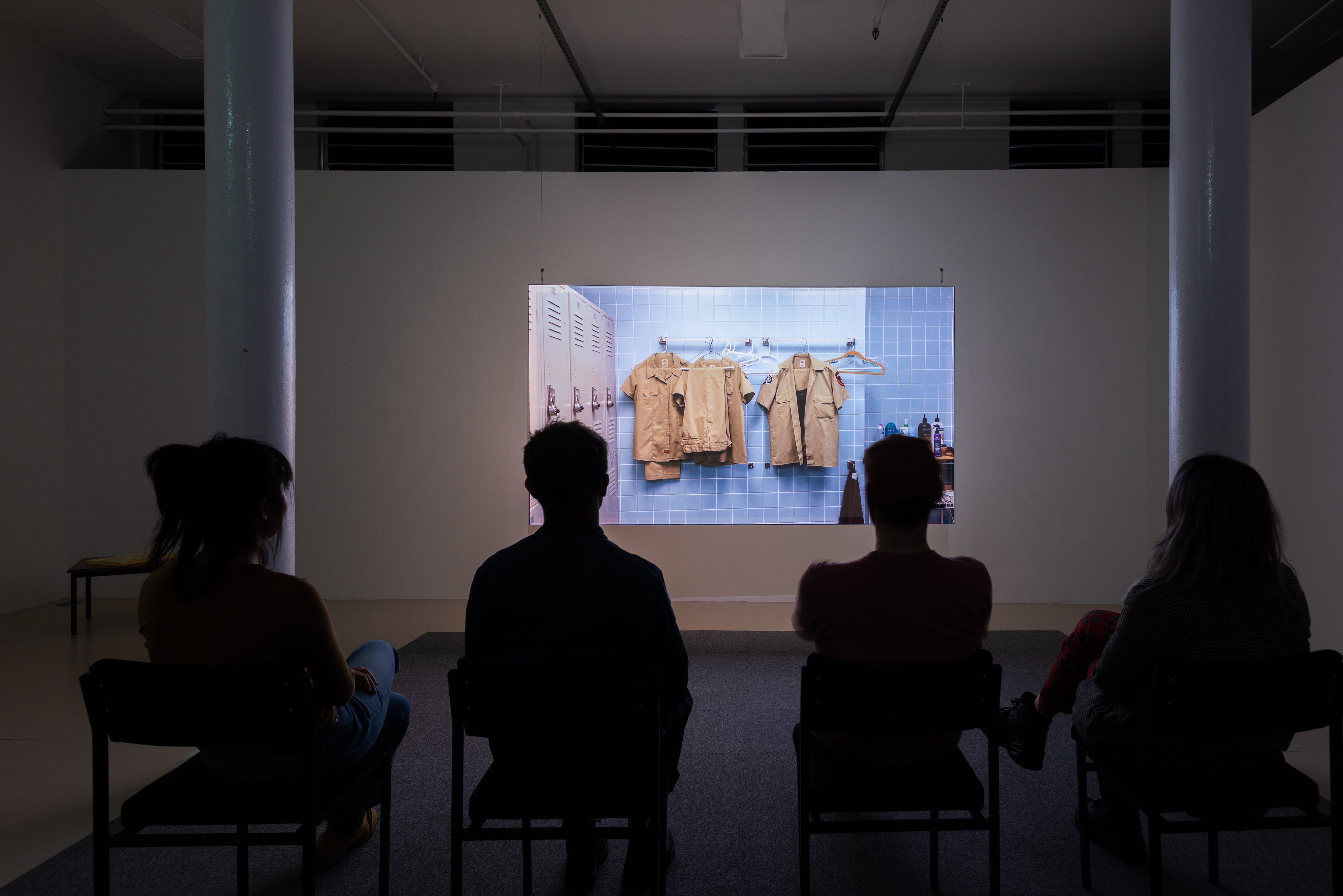Indications of Guilt, pt.1. Maud Craigie. 18.03.22-10.04.22




Exhibition:
18.03.22-10.04.22
Friday-Sunday, 12-6pm
Screened on the hour
Preview:
Thursday 17.03.22, 6.30-8.30pm
Location: South Kiosk London
18.03.22-10.04.22
Friday-Sunday, 12-6pm
Screened on the hour
Preview:
Thursday 17.03.22, 6.30-8.30pm
Location: South Kiosk London
South Kiosk are pleased to present Indications of Guilt, pt.1 by Maud Craigie. Indications of Guilt, pt.1 examines the structures of American police interrogation and their relationship to fictional screen representations of law enforcement.
In 2017, Craigie travelled to Texas to train in America’s widely used form of psychological interrogation. The techniques used have faced scrutiny in recent years due to high false confession rates. This training provided the raw material for a new body of work, centred around a single channel film.
The work combines staged and documentary methods to explore how psychological interrogation can function as a process for creating fiction, whilst ostensibly seeking to establish truth. Indications of Guilt, pt.1 has been exhibited previously at Mirror, Plymouth and at transmediale, Berlin.
The show features an essay conversation between Maud Craigie and curator Ben Evans James, first written to coincide with the exhibition of the film at transmediale festival 2021/2. Craigie’s research was supported by the Boise Travel Scholarship, Slade School of Fine Art, 2016.
Public Programme:
Verbal Cues
06.04.22 7-9pm
https://www.eventbrite.com/e/311053979827
This event is free and open to all, booking is recommended.
Future Artefacts FM radio show hosts Nina Davies and Niamh Schmidtke will present a series of audio clips to discuss the role of sound within Maud Craigie’s film Indications of Guilt, pt.1. The event will include found audio, along with a sound work from Craigie and segments from her film, to open up a conversation with attendees about the function of sound in truth telling, psychological interrogation and confession. Please note, this event includes an optional 7pm screening of Craigie’s film, followed by the discussion which will start at 8pm.
Future Artefacts FM is a bi-monthly talk show hosted by Nina Davies and Niamh Schmidtke, featuring speculative fiction audio works intended for broadcast; comprised of radio plays, short stories, fictional interviews and soundscapes. Airing every eighth Sunday at 13:00 (GMT) on https://rtm.fm/listen/future-artefacts/
Maud Craigie in conversation with Steve Greenfield and Leslie Moran
07.04.22 7-9pm
https://www.eventbrite.com/e/311034752317
This event is free and open to all, booking is recommended.
Following a 7pm screening of her film Indications of Guilt, pt.1, artist Maud Craigie will be joined by Professor Steve Greenfield and Professor Leslie Moran for a conversation about the work. Greenfield’s research covers the intersection between law and popular culture, including the portrayal of law in film, incorporating ideas from film theory and psychology. Moran’s research focuses on law and visual culture, with a particular interest in representations of lawyers and judges in visual media. Craigie’s film, Indications of Guilt, pt.1, examines the structures of American police interrogation and their relationship to fictional screen representations of law enforcement.
Steve Greenfield is a Professor at Westminster Law School where he founded the Centre for Law, Society and Popular Culture with Guy Osborn. He is co-editor of the book series Studies in Law, Society and Popular Culture and the Entertainment and Sports Law Journal. Steve's research covers a broad swathe of issues around the intersection between law and areas of popular culture. With respect to work on film in collaboration with Professors Osborn and Robson he produced the book Film and the Law and has incorporated ideas and theories from both film theory and psychology. He teaches a course on Cinematic Justice for law students.
Leslie Moran is Emeritus Professor of Law Birkbeck College and a senior research associate at the Institute of Advanced Legal Studies. Law and visual culture has been a major focus of his research with a particular interest in representations of lawyers and judges in various visual media. He curated a multi-disciplinary project ‘Judicial images’ that brought together artists, scriptwriters, communications experts as well as academics and members of the judiciary. His most recent book is Law Judges and Visual Culture (2021 Routledge). He also has an international reputation for his scholarship on criminal justice and hate crime in particular.
Indications of Guilt, pt. 1 - Closing Event
10.04.22 5-7pm
This event is free and open to all, no booking required.
To close Indications of Guilt, pt.1, South Kiosk invites you to a screening of films which explore ideas of evidence. Following the final screening of Maud Craigie’s Indications of Guilt, pt.1 at 5pm South Kiosk will present Jennifer Martin’s TEETH and Aura Satz’s Between the Bullet and the Hole, starting at 6pm.
If you have already seen Indications of Guilt, pt.1, you are welcome to join at 6pm. Extra seating and refreshments will be provided.
In TEETH, a couple interrogated by UK Home Office agents endures a series of assessments that become progressively performative to evidence their relationship’s legitimacy. The office space becomes a theatre stage for a gruelling audition of acceptability. Awkwardness quickly escalates into surreal horror.
Jennifer Martin (1990, USA/UK) is a London based artist filmmaker. Since graduating from the Slade School of Fine Art and Royal College of Art, her films have been screened at festivals including BlackStar, British Shorts Berlin, SOUL Fest, EMAF, Alchemy Film and Moving Image, RIDM, and more. She was awarded the 2018 Stuart Croft Foundation Education Award and selected for the FLAMIN fellowship 2019/20. Martin is a Film London Lodestar 2021 and winner of Best Screenplay at SOUL Fest 2021 for 'TEETH'. She is a co-director of the black and POC-led artist workers' cooperative not/nowhere, specialising in analogue film.
Between the Bullet and the Hole is a film centred on the elusive and complex effects of war on women’s role in ballistic research and early computing. The film features new and archival high speed bullet photography, schlieren and electric spark imagery, bullet sound wave imagery, forensic ballistic photography, slide rulers, punch cards, computer diagrams, and a soundtrack by Scanner. Like a frantic animation storyboard, it explores the flickering space between the frames, testing the perceptual mechanics of visual interpolation, the possibility of reading or deciphering the gap between before and after. Interpolation – the main task of the women studying ballistics in WW2 – is the construction or guessing of missing data using only two known data points. The film tries to unpack this gap, open it up to interrogation. It questions how we read, interpolate or construct the gaps between bullet and hole, perpetrator and victim, presence and absence.
Aura Satz’s work encompasses film, sound, performance and sculpture. Her work centres on the trope of ventriloquism in order to conceptualise a distributed, expanded and shared notion of voice. Works are made in conversation and use dialogue as both method and subject matter. Satz has made a body of work centred on various sound technologies in order to explore notation systems, code and encryption, and ways in which these might resist standardisation, generating new soundscapes, and in turn new forms of listening and attending to the other. She has performed, exhibited and screened her work nationally and internationally.
In 2017, Craigie travelled to Texas to train in America’s widely used form of psychological interrogation. The techniques used have faced scrutiny in recent years due to high false confession rates. This training provided the raw material for a new body of work, centred around a single channel film.
The work combines staged and documentary methods to explore how psychological interrogation can function as a process for creating fiction, whilst ostensibly seeking to establish truth. Indications of Guilt, pt.1 has been exhibited previously at Mirror, Plymouth and at transmediale, Berlin.
The show features an essay conversation between Maud Craigie and curator Ben Evans James, first written to coincide with the exhibition of the film at transmediale festival 2021/2. Craigie’s research was supported by the Boise Travel Scholarship, Slade School of Fine Art, 2016.
Public Programme:
Verbal Cues
06.04.22 7-9pm
https://www.eventbrite.com/e/311053979827
This event is free and open to all, booking is recommended.
Future Artefacts FM radio show hosts Nina Davies and Niamh Schmidtke will present a series of audio clips to discuss the role of sound within Maud Craigie’s film Indications of Guilt, pt.1. The event will include found audio, along with a sound work from Craigie and segments from her film, to open up a conversation with attendees about the function of sound in truth telling, psychological interrogation and confession. Please note, this event includes an optional 7pm screening of Craigie’s film, followed by the discussion which will start at 8pm.
Future Artefacts FM is a bi-monthly talk show hosted by Nina Davies and Niamh Schmidtke, featuring speculative fiction audio works intended for broadcast; comprised of radio plays, short stories, fictional interviews and soundscapes. Airing every eighth Sunday at 13:00 (GMT) on https://rtm.fm/listen/future-artefacts/
Maud Craigie in conversation with Steve Greenfield and Leslie Moran
07.04.22 7-9pm
https://www.eventbrite.com/e/311034752317
This event is free and open to all, booking is recommended.
Following a 7pm screening of her film Indications of Guilt, pt.1, artist Maud Craigie will be joined by Professor Steve Greenfield and Professor Leslie Moran for a conversation about the work. Greenfield’s research covers the intersection between law and popular culture, including the portrayal of law in film, incorporating ideas from film theory and psychology. Moran’s research focuses on law and visual culture, with a particular interest in representations of lawyers and judges in visual media. Craigie’s film, Indications of Guilt, pt.1, examines the structures of American police interrogation and their relationship to fictional screen representations of law enforcement.
Steve Greenfield is a Professor at Westminster Law School where he founded the Centre for Law, Society and Popular Culture with Guy Osborn. He is co-editor of the book series Studies in Law, Society and Popular Culture and the Entertainment and Sports Law Journal. Steve's research covers a broad swathe of issues around the intersection between law and areas of popular culture. With respect to work on film in collaboration with Professors Osborn and Robson he produced the book Film and the Law and has incorporated ideas and theories from both film theory and psychology. He teaches a course on Cinematic Justice for law students.
Leslie Moran is Emeritus Professor of Law Birkbeck College and a senior research associate at the Institute of Advanced Legal Studies. Law and visual culture has been a major focus of his research with a particular interest in representations of lawyers and judges in various visual media. He curated a multi-disciplinary project ‘Judicial images’ that brought together artists, scriptwriters, communications experts as well as academics and members of the judiciary. His most recent book is Law Judges and Visual Culture (2021 Routledge). He also has an international reputation for his scholarship on criminal justice and hate crime in particular.
Indications of Guilt, pt. 1 - Closing Event
10.04.22 5-7pm
This event is free and open to all, no booking required.
To close Indications of Guilt, pt.1, South Kiosk invites you to a screening of films which explore ideas of evidence. Following the final screening of Maud Craigie’s Indications of Guilt, pt.1 at 5pm South Kiosk will present Jennifer Martin’s TEETH and Aura Satz’s Between the Bullet and the Hole, starting at 6pm.
If you have already seen Indications of Guilt, pt.1, you are welcome to join at 6pm. Extra seating and refreshments will be provided.
In TEETH, a couple interrogated by UK Home Office agents endures a series of assessments that become progressively performative to evidence their relationship’s legitimacy. The office space becomes a theatre stage for a gruelling audition of acceptability. Awkwardness quickly escalates into surreal horror.
Jennifer Martin (1990, USA/UK) is a London based artist filmmaker. Since graduating from the Slade School of Fine Art and Royal College of Art, her films have been screened at festivals including BlackStar, British Shorts Berlin, SOUL Fest, EMAF, Alchemy Film and Moving Image, RIDM, and more. She was awarded the 2018 Stuart Croft Foundation Education Award and selected for the FLAMIN fellowship 2019/20. Martin is a Film London Lodestar 2021 and winner of Best Screenplay at SOUL Fest 2021 for 'TEETH'. She is a co-director of the black and POC-led artist workers' cooperative not/nowhere, specialising in analogue film.
Between the Bullet and the Hole is a film centred on the elusive and complex effects of war on women’s role in ballistic research and early computing. The film features new and archival high speed bullet photography, schlieren and electric spark imagery, bullet sound wave imagery, forensic ballistic photography, slide rulers, punch cards, computer diagrams, and a soundtrack by Scanner. Like a frantic animation storyboard, it explores the flickering space between the frames, testing the perceptual mechanics of visual interpolation, the possibility of reading or deciphering the gap between before and after. Interpolation – the main task of the women studying ballistics in WW2 – is the construction or guessing of missing data using only two known data points. The film tries to unpack this gap, open it up to interrogation. It questions how we read, interpolate or construct the gaps between bullet and hole, perpetrator and victim, presence and absence.
Aura Satz’s work encompasses film, sound, performance and sculpture. Her work centres on the trope of ventriloquism in order to conceptualise a distributed, expanded and shared notion of voice. Works are made in conversation and use dialogue as both method and subject matter. Satz has made a body of work centred on various sound technologies in order to explore notation systems, code and encryption, and ways in which these might resist standardisation, generating new soundscapes, and in turn new forms of listening and attending to the other. She has performed, exhibited and screened her work nationally and internationally.